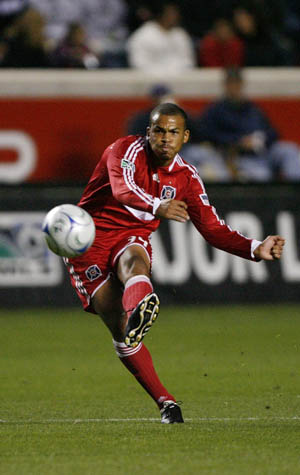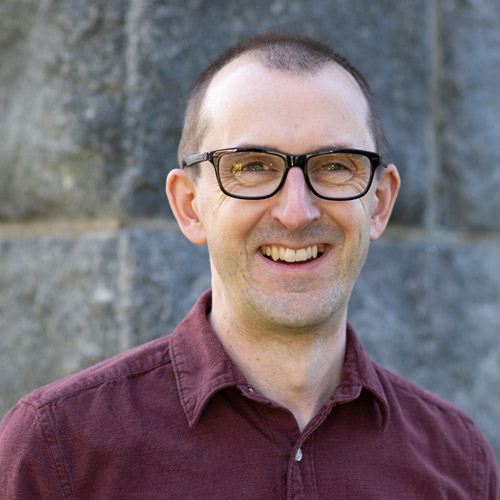Trading His Cleats for the Pulpit
Former soccer pro Austin Washington switches up his game

The Estadio Banorte is sold out. It’s just a preseason game, but you wouldn’t guess it from the more than 20,000 soccer fans cheering, whooping, whistling, and singing. The sound reverberates around the home of the Club Social y Deportivo Sinaloa—the Dorados—in western Mexico.
It’s February 27, 2008, and this is Austin Washington’s Major League Soccer (MLS) debut: the Chicago Fire versus the Dorados. Five weeks before—until the Fire picked him in the fourth round of the 2008 MLS SuperDraft—Washington (STH’16) was just another college soccer prospect. Now, he’s limbering up below a wall of noise, swallowing the rising panic. The referee puts the whistle to his lips. The din of the crowd tumbles from the stands. One last stretch. The referee throws his arms forward and blows hard on the whistle.
The crowds still roar, but not for Washington. In January 2010, the Fire hired a new coach; the following month, it announced in a press release it was waiving Washington.
Since getting cut from the Fire, Washington has started over, completing his undergraduate degree and working in patient care and on a maintenance crew to pay the bills. Last year, the former soccer star spent his summer in the roe room of an Alaskan canning factory. There, Washington spent long days—20-hour shifts were not unheard of—scooping salmon eggs from sacks, lathering them in soy sauce, and packaging them for hungry customers in Japan. It was a way to pay for what he had planned next: seminary.
When he was growing up, says Washington, he never had a plan B. He loved soccer and dreamed of playing abroad. When he won a scholarship to Gonzaga University and “figured out I was capable enough to compete, really compete,” the dream seemed like it might become reality. Five weeks after the draft call came, he was in the Estadio Banorte, playing a solid 83 minutes for the one-time MLS Cup–winning Chicago Fire. In his two years with the Fire, Washington played defense and midfield, reached a North American SuperLiga final, and spent a spell on loan to the Cleveland City Stars.

He hasn’t kicked a ball competitively since. When you’ve starred at the top, he says, it’s “almost like going backwards” to play anywhere else. Besides, he adds, “I don’t want to get injured anymore, kicked anymore. I do like playing soccer with kids; they just want to be out there having a good time—you don’t have to worry about people being too competitive.”
Without soccer, he needed another calling. A pastor friend suggested divinity school, so in spring 2013, Washington decided on a different kind of tryout. “I was thinking about peace-building,” he says, so he took two classes at BU’s School of Theology, renowned for its Religion & Conflict Transformation program. It drafted him—or he drafted it—and he started last fall as a full-time Master of Divinity student.
STH is where Washington hopes to figure out what God is asking of him. At the moment, he’s trying to discern whether his future lies at the pulpit or in a nonprofit focused on conflict resolution. Soft-spoken and a reluctant public speaker, Washington doesn’t seem like a natural preacher, but appearances can be deceptive. As a soccer player, he often surprised people who knew him off the field only. “I tend to be a pretty laid-back person, and people don’t often think I’m as competitive as I am.” If he’s called to ministry, the nerves will probably disappear, just as they did at his Fire debut in Mexico. “It’s really about giving what’s asked,” he says of any possible pastoral post.
For the past three years, Washington has been a deacon of the Church of God in Christ—the largest Pentecostal denomination in the country—leading youth in Bible study, driving congregants to services, and presenting the occasional sermon. As someone who grew up in a Pentecostal church that held a literal interpretation of the Bible, Washington says STH has prompted him to question his beliefs and let his “own theology just fall apart, my own opinions, everything, just melt.” It’s uncomfortable, he admits, but that’s why he chose a seminary beyond the comfort zone of his upbringing. “The whole idea is to know God. I imagine that’s why, on some level, everyone goes to divinity school. The better I can understand what’s going on or just how to approach life, the better.”
There was another big factor in his decision to come to STH: learning more about former Dean of Marsh Chapel Howard Thurman (Hon.’67). “I was thoroughly impressed with him. I’d love to take a class on him, as well as on Martin Luther King, Jr.”
Washington is looking forward: he’s excited to learn more about Thurman, study the Hebrew Bible, and “figure out who Christ was.” He’s no longer an ex-soccer player looking back; he’s just another student contemplating what he can do with life and where he can be of help.
A version of this story was published in the spring 2014 edition of Focus.
Andrew Thurston can be reached at thurston@bu.edu.

Comments & Discussion
Boston University moderates comments to facilitate an informed, substantive, civil conversation. Abusive, profane, self-promotional, misleading, incoherent or off-topic comments will be rejected. Moderators are staffed during regular business hours (EST) and can only accept comments written in English. Statistics or facts must include a citation or a link to the citation.